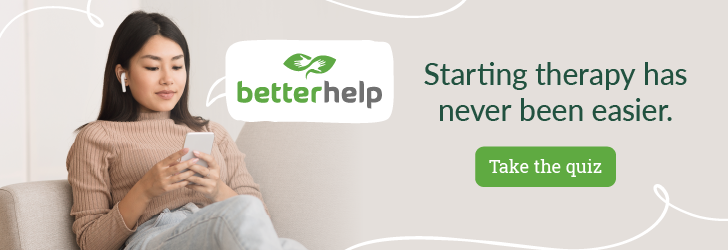Full Disclosure: Clicking on these links could mean a tiny commission for me, at no extra cost to you.
Starting a journey of online therapy is a powerful and transformative step towards prioritizing your mental health and well-being. In this digital age, the convenience and accessibility of online therapy offers you a unique opportunity to start your healing journey right from the comfort of your own space. And by choosing to start therapy, you’re giving yourself with a supportive and non-judgmental space where you can explore your thoughts, emotions, and experiences and develop coping strategies. So, let’s take a look at the top online therapy options for 2025.
Best Online Therapy Services of 2025
- Best for Availability: BetterHelp
- Best for Couples: ReGain or Our Ritual
- Best for Affordability: Talk Space
- Best for Psychiatry: Brightside
- Best for Teens: Teen Counseling
- Best for Anxiety and Depression: Brightside
- Best for LGBTQIA+: Pride Counseling
What is Online Therapy?
Online therapy, also known as teletherapy or e-therapy, refers to the mental health services like therapy and counseling that you can do over the internet. It’s as simple as that. This form of therapy allows you to receive professional counseling and psychological help through various online platforms, such as video conferencing, direct messaging, text messaging or phone calls.
Online therapy has become increasingly popular for several reasons:
- Convenience: Online therapy eliminates the need for you to travel to a physical location for therapy sessions. This is particularly beneficial for those with mobility issues, busy schedules, or limited access to transportation.
- Accessibility: Online therapy can reach people in remote or underserved areas where in-person mental health services may be scarce. It also facilitates access for people who may be uncomfortable or stigmatized by traditional face-to-face therapy.
- Anonymity: Some people may feel more comfortable discussing personal issues online due to a perceived sense of anonymity. This can be especially important for topics that carry stigma or shame.
- Flexibility: Online therapy often provides greater flexibility in scheduling appointments. This can be helpful for people with irregular work hours, frequent travel, or other time constraints.
- Cost-effectiveness: In some cases, online therapy may be more affordable than traditional in-person therapy, as it eliminates costs associated with travel and office space.
Online therapy can take various forms, including video conferencing sessions, instant messaging/chat sessions, phone calls, or a combination of these. Many licensed therapists and mental health professionals offer online therapy services, and there are also dedicated online therapy platforms that connect you with licensed therapists.
Advertisement
⚡ Access Treatment Right Now
→ Online Therapy – Talk to a licensed therapist today through BetterHelp. Affordable, private, and convenient therapy starting at $65/week. Take the Free Assessment to get matched now.
→ Digital Psychiatry – Connect with a provider in 12–48 hours via Hims/Hers. Explore FDA-approved medication options — no insurance required. Get Started Today.
Types of Online Therapy Services
A wide range of therapeutic approaches and interventions can be offered online. Many traditional therapeutic modalities have successfully transitioned to online platforms. Here are some common types of therapy that are often available online:
- Cognitive-Behavioral Therapy (CBT): CBT is a widely used form of psychotherapy that focuses on identifying and changing negative thought patterns and behaviors. It can be effectively delivered through online platforms.
- Talk Therapy/Psychotherapy: This encompasses various therapeutic approaches that involve talking through issues with a trained therapist. Psychodynamic therapy, humanistic therapy, and other forms of counseling can be conducted online.
- Mindfulness-Based Therapies: Therapies that incorporate mindfulness, such as Mindfulness-Based Stress Reduction (MBSR) or Mindfulness-Based Cognitive Therapy (MBCT), can be adapted for online delivery.
- Dialectical Behavior Therapy (DBT): DBT is a type of cognitive-behavioral therapy that focuses on building skills in areas like emotional regulation, interpersonal effectiveness, and distress tolerance. It can be provided online.
- Acceptance and Commitment Therapy (ACT): ACT is a form of cognitive-behavioral therapy that emphasizes acceptance of thoughts and feelings and commitment to values-based actions. It can be delivered through online platforms.
- Family Therapy: Online platforms can facilitate family therapy sessions, allowing multiple participants to join from different locations.
- Group Therapy: Various group therapy formats, such as support groups, process groups, or psychoeducational groups, can be conducted online.
- Online Anxiety Treatment: A targeted therapy for anxiety disorders, it focuses on overcoming symptoms and fostering significant life improvements. Through regular sessions with skilled online therapists, clients learn to manage anxiety effectively, gaining new insights and skills for a more fulfilling life
It’s essential to note that the availability of specific types of therapy online may depend on the individual therapist, their training, and the platform used. Online therapy platforms often have a diverse range of therapists with various specialties and modalities, allowing you to find a therapist who aligns with their specific needs and preferences.
The Best Online Therapy Services in 2025
It’s crucial to pick the right online therapy platform that resonates with you and your goals. Take the time to check out the different types of online therapy available and find the one that suits you. Your mental well-being is a big deal, and landing on the perfect platform can make a real difference in how effective your therapy journey is. Do some digging, look into the features, perks, and what users are saying about different platforms. Your mental health matters, so finding the best fit for you is a major step toward making positive changes.
And hey, to make things easier for you, here are the best online therapy services for 2025:
Better Help
Advertisement

Price: $65 to $90 per week
BetterHelp is an online counseling platform that provides therapy services through video calls, phone calls, and messaging. It connects you with licensed mental health professionals, including psychologists, licensed professional counselors (LPCs), marriage and family therapists (MFTs), and clinical social workers. Currently, they have a network of over 30,000 therapists and serve all 50 states and over 200 countries.
Key Features of BetterHelp:
- Accessibility: BetterHelp offers convenient access to therapy services from the comfort of your own space. This can be particularly beneficial for those who have difficulty accessing in-person therapy.
- Variety of Communication Methods: You can choose to communicate with your therapist through video calls, phone calls, or messaging, providing flexibility based on personal preferences and comfort levels.
- Therapist Matching: BetterHelp matches you with a therapist based on your specific needs and preferences. You can also request a different therapist if you feel the initial match is not the right fit.
- Broad Range of Therapeutic Modalities: The platform supports various therapeutic approaches, allowing you to find a therapist who specializes in the specific type of therapy you are seeking.
- Affordability: BetterHelp offers subscription-based pricing, which includes unlimited messaging and a certain number of live sessions per month. This can be more cost-effective for some people compared to traditional in-person therapy.
- User-Friendly Platform: The online platform is designed to be user-friendly, with easy navigation and tools to facilitate communication between you and your therapist.
Try Now: Take The ‘Find a Therapist’ Quiz
Teen Counseling
Advertisement

Teen Counseling is an online therapy platform specifically designed to provide mental health support to teenagers. Similar to platforms like BetterHelp, Teen Counseling connects users with licensed therapists through an online platform.
Key Features of Teen Counseling:
- Specialized for Teens: Teen Counseling is tailored to the unique needs of teenagers, addressing the challenges and issues that adolescents commonly face.
- Licensed Therapists: The platform connects users with licensed mental health professionals, including psychologists, licensed professional counselors (LPCs), marriage and family therapists (MFTs), and clinical social workers.
- Various Communication Methods: Users have the option to communicate with their therapist through different means, such as video calls, phone calls, or messaging. This flexibility allows teens to choose the method that is most comfortable for them.
- Parental Involvement: Given that users are minors, Teen Counseling involves parents or guardians in the process. Parents can play a role in supporting their teen’s therapy journey and staying informed about their progress.
- Affordability: The platform typically offers a subscription-based pricing model, which may include unlimited messaging and a certain number of live sessions per month. This can make mental health support more accessible for families.
Try Now: Teen Counseling
Pride Counseling
Advertisement

Price: $60 and $90 per week
Pride Counseling is an online therapy platform that specifically focuses on providing mental health support to people who identify as members of the LGBTQ+ community. Like other online counseling services, Pride Counseling connects users with licensed therapists through an online platform.
Key Features of Pride Counseling:
- LGBTQ+ Focus: Pride Counseling is designed to address the unique mental health needs and challenges faced by individuals who identify as lesbian, gay, bisexual, transgender, queer, or any other non-heteronormative sexual orientation or gender identity.
- Licensed Therapists: The platform connects users with licensed mental health professionals, including psychologists, licensed professional counselors (LPCs), marriage and family therapists (MFTs), and clinical social workers, who have experience and expertise in working with LGBTQ+ individuals.
- Various Communication Methods: Users can communicate with their therapist through different modalities, such as video calls, phone calls, or messaging, providing flexibility based on individual preferences.
- Affordability: The platform typically offers a subscription-based pricing model, which may include unlimited messaging and a certain number of live sessions per month. This structure aims to make mental health support more accessible.
- Cultural Sensitivity: Therapists on Pride Counseling are often trained to be culturally sensitive to the diverse experiences within the LGBTQ+ community. This includes understanding the impact of discrimination, coming out experiences, and navigating relationships.
Try Now: Pride Counseling
ReGain Couples Therapy
Advertisement

Price: $65 to $90 per week
Regain, now known as “BetterHelp for Couples,” is an online therapy platform that specializes in providing couples counseling. It is designed to offer support and assistance to individuals and couples facing challenges in their relationships. But couples counseling isn’t just for those going through tough times in their relationship. It can be an effective way to maintain a healthy relationship, offering a chance to strengthen communication, trust, and celebrate the special bond you share with your partner.
You can sign up for Regain relationship counseling solo or bring your partner along. It’s flexible, just like relationships are. So whether you’re in a new romance or a long-term partnership, ReGain is there for you.
Key Features of Regain (BetterHelp for Couples):
- Couples Therapy: Regain is tailored to address the specific needs and challenges that couples may face. It offers a platform for individuals to engage in joint counseling sessions with a licensed couples therapist.
- Licensed Therapists: Users on Regain are connected with licensed marriage and family therapists (MFTs) or licensed professional counselors (LPCs) who have experience and expertise in working with couples.
- Communication Methods: Couples can communicate with their therapist through various means, including video calls, phone calls, and messaging. The platform allows for flexibility based on the preferences of the individuals involved.
- Accessibility: Regain provides a convenient option for couples who may face barriers to in-person therapy, such as time constraints, geographic distance, or scheduling conflicts.
- Affordability: The platform typically offers a subscription-based pricing model, which may include unlimited messaging and a certain number of live sessions per month. This structure aims to make couples therapy more accessible.
Try Now: ReGain Couples Therapy
Bright Side Therapy
Key Features of Bright Side Therapy:
- Accessibility: Bright Side Therapy provides easy access to therapy services right from the convenience of your own space. This proves advantageous for people facing challenges accessing traditional in-person therapy.
- Variety of Communication Methods: Users can choose to communicate with their therapist through video calls, phone calls, or messaging. This gives you flexibility based on personal preferences and comfort levels.
- Custom-Built Treatment Plans: Receive personalized guidance from a licensed therapist to develop a specialized plan for addressing issues like anxiety, depression, and more.
- Broad Range of Therapeutic Modalities: The platform accommodates diverse therapeutic approaches, enabling users to discover a therapist who specializes in the particular type of therapy you are looking for.
- Affordability and Insurance: Bright Side Therapy a variety of payment models a also accepted by most insurance plans. This presents a more budget-friendly option for many people when compared to the costs of traditional, in-person therapy.
- Comes with Extra Self-Help Resources: Gain extra knowledge and assistance with a 10-lesson program designed to integrate skill-building exercises seamlessly into your daily routine.
- Personalized Psychiatry: When medication is deemed necessary, their psychiatric providers swiftly and accurately assess over 100 data points to identify the treatment that is likely to be both well-tolerated and effective for your specific needs.
Try Now: Take The Free Assessment
How to Choose the Best Online Therapy for You
Choosing the right online therapy service is a big decision, and there are several factors to consider to ensure it meets your needs and preferences.
First off, think about how you want to receive therapy. Do you prefer live video sessions, phone calls, texting, or a mix of these options? Understanding your preferred format can help narrow down your choices.
Next, take a close look at the different plan options available. Consider the level of interaction you desire and how many sessions you’ll get per month. If live video sessions are important to you, make sure to check each plan’s inclusion of sessions and whether you can add extra sessions if necessary.
If you have any doubts or questions, don’t hesitate to reach out to customer service for clarification. Find out if you can pause your subscription or switch therapists if you’re not satisfied with your current one.
Understanding the refund policy is also crucial. While many services allow you to cancel your subscription at the end of the month, you may not receive a refund for unused days, so it’s essential to know the details upfront.
Additionally, ensure that the service offers the type of provider you’re seeking. If you’re interested in sessions with a psychiatrist, make sure they have one available in your state.
Lastly, don’t forget to ask if you can interview therapists to find the right fit for you. It’s essential to feel comfortable and connected with your therapist for effective therapy. You may also want to ask about their training, therapeutic approaches, and any specific concerns, needs or preferences you have.
Questions to Ask Before You Sign Up for Online Therapy
Before diving into online therapy, take a moment to consider a few key questions:
- Are These Online Therapists Licensed? The American Psychological Association (APA) warns that not all therapists offering services online may be professionally licensed. While some platforms ensure their therapists are licensed, it’s essential to verify this information to ensure you’re receiving quality care.
- Is Online Therapy the Best Option for Me? Online therapy isn’t for everyone or every situation. For example, individuals with certain mental disorders or those who pose a risk to themselves or others may require more intensive care. However, studies suggest that both professionals and patients view telehealth positively, and it can be just as effective as in-person therapy. Some even find it more comfortable and conducive to opening up.
- Does My Insurance Cover Online Therapy? If the online therapy provider accepts insurance, they can handle billing directly with your insurer. You’ll still be responsible for copays and deductibles, though. If insurance isn’t accepted, you may be able to submit your bills for reimbursement, depending on your plan. Keep in mind that having a diagnosis may be necessary for insurance coverage. Additionally, you might be able to utilize your health savings account (HSA) or flexible savings account (FSA) to cover online therapy expenses.
How to Prepare for an Online Therapy Session?
How much does online therapy cost?
You might be wondering about the cost of online therapy. Well, it really depends on what kind of support you’re looking for and what your insurance or employer covers.
For instance, if you opt for a service like BetterHelp, you can expect to pay between $60 to $90 per week for their e-therapy sessions. On the other hand, traditional therapy sessions typically range from $75 to $200 per session.
But hey, don’t worry if those prices seem a bit steep. There are plenty of affordable online therapy options out there too. So, finding the right fit for your budget is definitely doable.
Does Insurance Cover Online Therapy?
According to the Health Resources and Services Administration (HRSA), which is part of the U.S. Department of Health and Human Services (HHS), most insurance providers do include some form of telehealth service in their coverage. In fact, in 42 states and Washington, D.C., private insurance is required to reimburse for telemedicine.
Plus, with the rise of COVID-19, many commercial health plans have expanded their telehealth services. However, whether your insurance covers online therapy specifically will ultimately depend on your individual insurance provider and plan. Always check with them directly to see what’s covered.









